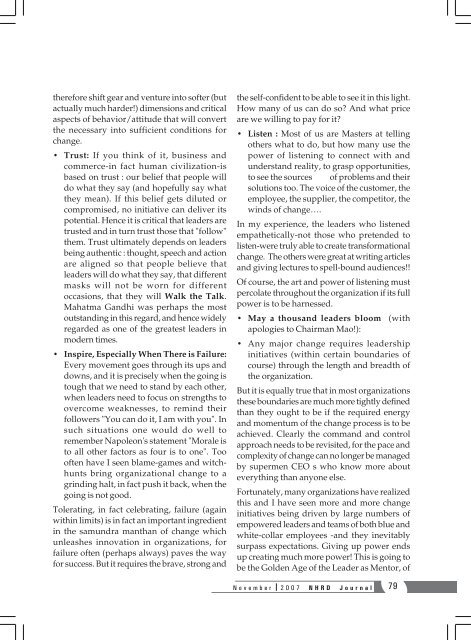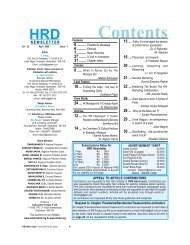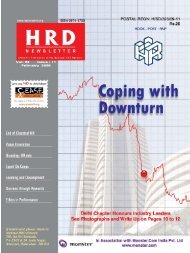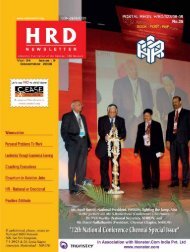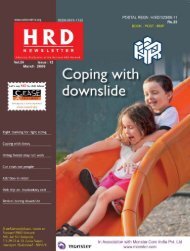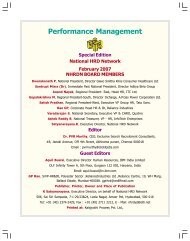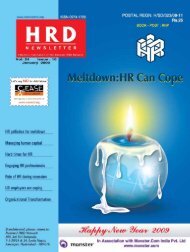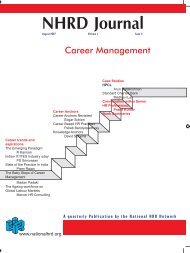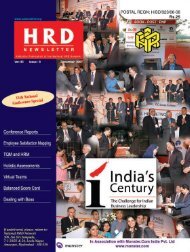NHRD Journal - National HRD Network
NHRD Journal - National HRD Network
NHRD Journal - National HRD Network
You also want an ePaper? Increase the reach of your titles
YUMPU automatically turns print PDFs into web optimized ePapers that Google loves.
therefore shift gear and venture into softer (but<br />
actually much harder!) dimensions and critical<br />
aspects of behavior/attitude that will convert<br />
the necessary into sufficient conditions for<br />
change.<br />
• Trust: If you think of it, business and<br />
commerce-in fact human civilization-is<br />
based on trust : our belief that people will<br />
do what they say (and hopefully say what<br />
they mean). If this belief gets diluted or<br />
compromised, no initiative can deliver its<br />
potential. Hence it is critical that leaders are<br />
trusted and in turn trust those that "follow"<br />
them. Trust ultimately depends on leaders<br />
being authentic : thought, speech and action<br />
are aligned so that people believe that<br />
leaders will do what they say, that different<br />
masks will not be worn for different<br />
occasions, that they will Walk the Talk.<br />
Mahatma Gandhi was perhaps the most<br />
outstanding in this regard, and hence widely<br />
regarded as one of the greatest leaders in<br />
modern times.<br />
• Inspire, Especially When There is Failure:<br />
Every movement goes through its ups and<br />
downs, and it is precisely when the going is<br />
tough that we need to stand by each other,<br />
when leaders need to focus on strengths to<br />
overcome weaknesses, to remind their<br />
followers "You can do it, I am with you". In<br />
such situations one would do well to<br />
remember Napoleon's statement "Morale is<br />
to all other factors as four is to one". Too<br />
often have I seen blame-games and witchhunts<br />
bring organizational change to a<br />
grinding halt, in fact push it back, when the<br />
going is not good.<br />
Tolerating, in fact celebrating, failure (again<br />
within limits) is in fact an important ingredient<br />
in the samundra manthan of change which<br />
unleashes innovation in organizations, for<br />
failure often (perhaps always) paves the way<br />
for success. But it requires the brave, strong and<br />
the self-confident to be able to see it in this light.<br />
How many of us can do so? And what price<br />
are we willing to pay for it?<br />
• Listen : Most of us are Masters at telling<br />
others what to do, but how many use the<br />
power of listening to connect with and<br />
understand reality, to grasp opportunities,<br />
to see the sources of problems and their<br />
solutions too. The voice of the customer, the<br />
employee, the supplier, the competitor, the<br />
winds of change….<br />
In my experience, the leaders who listened<br />
empathetically-not those who pretended to<br />
listen-were truly able to create transformational<br />
change. The others were great at writing articles<br />
and giving lectures to spell-bound audiences!!<br />
Of course, the art and power of listening must<br />
percolate throughout the organization if its full<br />
power is to be harnessed.<br />
• May a thousand leaders bloom (with<br />
apologies to Chairman Mao!):<br />
• Any major change requires leadership<br />
initiatives (within certain boundaries of<br />
course) through the length and breadth of<br />
the organization.<br />
But it is equally true that in most organizations<br />
these boundaries are much more tightly defined<br />
than they ought to be if the required energy<br />
and momentum of the change process is to be<br />
achieved. Clearly the command and control<br />
approach needs to be revisited, for the pace and<br />
complexity of change can no longer be managed<br />
by supermen CEO s who know more about<br />
everything than anyone else.<br />
Fortunately, many organizations have realized<br />
this and I have seen more and more change<br />
initiatives being driven by large numbers of<br />
empowered leaders and teams of both blue and<br />
white-collar employees -and they inevitably<br />
surpass expectations. Giving up power ends<br />
up creating much more power! This is going to<br />
be the Golden Age of the Leader as Mentor, of<br />
November 2007 <strong>N<strong>HRD</strong></strong> <strong>Journal</strong> 79


